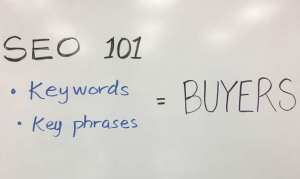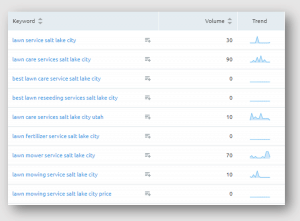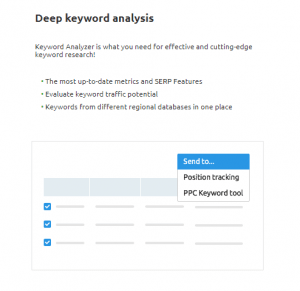The Best Way to Do Keyword Research and Development
Keywords, key phrases, key ideas! The fact you’re reading this indicates you’re somewhat familiar with these terms, as well as their importance for Search Engine Optimization (SEO). However, unraveling, understanding, debunking misconceptions, and, ultimately, utilizing and profiting from good keyword research can be quite tricky and require some know how. In order to understand the grand importance of how keyword research improves SEO and profits, let’s begin with a simple example, something that you’re likely familiar with, and easy to understand . . .

Have you ever been in a situation similar to this? You’re getting ready to drive to an important appointment, and while rushing out of your house, briefcase and already-too-cold coffee mug in hand, you quickly grab keys, head to the garage, and get into your shiney and sporty new sedan?
“Oh,” you smile to yourself, “wait til Morgan sees this German beauty. He’ll break up with his girlfriend and propose to these sexy charcoal curves on the spot!”
You then place the key in the ignition, anticipating that European purr, you turn, and . . . nothing happens?
The ignition won’t turn. No purr — just brand new, sparkly . . . silence.
Huh?
Maybe it’s jammed, so you try again. Alarmed, you look at the key and realize it says “Chevrolet,” not “BMW.”
Oops!
Of course, you run back, replace the domestic keys with foreign, and now she’s purring like a pussy cat.
Anybody who drives has probably experienced something like this. If not, you’ve at least used the wrong key to unsuccessfully unlock something . . . right?
Good — we’re on common ground.
Liken this to a very similar, and extremely common business frustration: You’ve selected a set of keywords and key phrases for your website, blogs, and other digital communications that you’re hoping will rank your company high in what is perhaps the most important link to prospective clients and customers to your business: SEO.

Maybe you’ve come up with these keyword research and phrases at the behest of your “digital guy,” or “SEO pro.” Perhaps, even, your team has managed to “rank” your company on Page 1 of Google searches for these keywords.
Now, ranking high on Page 1 is important, because if you’re not there, very few people will ever see you. Why? Almost every Google search on Planet Earth (and probably, other internet-equipped planets) ends on Page 1. People have been shown in studies to not venture to Page 2.
But . . . even though you’re on Page 1, there’s a big problem: You’re not getting any leads. If you’re a service business, nobody is filling out your landing page form, or calling your number. If you’re an eCommerce site, nobody is buying anything.
But darn, I’m on Page 1, and for some of these words, we’re in the top three. And on a few, we are actually in the Numero Uno spot! What’s wrong?
Here’s what’s wrong: You have the wrong keywords and phrases. Sure, you rank high with them, but these are not buying words or phrases. You, your digital team, or even your SEO professionals have missed the mark, and you’ve been left to flounder, due to poor keyword research and utilization.
Beware of SEO Firms with Inferior Keyword Research Services
When determining whether to go in-house for SEO, or to hire a firm, one checklist item should be to inquire about their keyword prowess, even what sort of keyword research service they render, and ask for success story referrals. When asked about SEO agencies’ abilities to produce good ROI through salient, relevant buying keywords, Scott Paxton, a world authority on SEO relates,
Recently a new client came to us that had hired a well-established SEO agency. After 6 months the company was proud to find that their site was finally ranking for some search phrases. Upon digging into their rankings we realized that the keywords they were targeting were generating 24 searches-per-month and no buyers. It was clear that the SEO firm they hired didn’t utilize advanced keyword research services, nor did they bother too much with any sort of keyword discovery. We quickly analyzed their competitors and discovered dozens of good buying keywords which would have produced thousands of new potential buyers monthly. Sadly, this company had wasted six months of time and money on a keyword strategy that was doomed from the beginning.
The Best ROI: Why Keyword Research is So Important
 According to Paxton, the prime objective, and the fastest way to high ROI, is to implement “buying key words and phrases,” not just keywords that call general attention to your company.
According to Paxton, the prime objective, and the fastest way to high ROI, is to implement “buying key words and phrases,” not just keywords that call general attention to your company.
Paxton, who consults for hundreds of SEO providers worldwide, and whose software tools have been used by over 900 SEO companies, says that “an effective keyword strategy can be the difference between a company being profitable or losing money. Keyword research and discovery should play a significant role in any SEO plan.”
Traffic vs Intent
You’ve probably heard eCommerce experts talk and blog about the importance of traffic. Maybe you talk about it yourself, and understand the importance of it.
And it’s a given, the first chapter in SEO 101. If nobody’s reading your company’s blogs, or going to your site, or landing on customer-response pages, you’re not going to gain much traction. But Paxton thinks the pure importance of traffic is overplayed at the expense of what is actually motivating Mr. and Mrs. Buyer.
 “Too often people look at keywords and focus on the traffic count rather than the intent of the searcher. While traffic should play into the equation, intent should be the top metric to consider.”
“Too often people look at keywords and focus on the traffic count rather than the intent of the searcher. While traffic should play into the equation, intent should be the top metric to consider.”
A natural facet of human nature, a fairly egocentric tendency on the part of business owners and executives, is to think people are primarily interested in the company itself, rather than specific things they can buy from the company. This sort of psychological projection exists because the executives and marketing team tend to “project” upon other people (in this case, “Googlers”) what their own main concern and focus is. The executive is focused on the company; the Googler is focused on what the company offers.
How then, can you find “intent,” and work it into keywords and phrases?
“Buyers with Wallet in Hand, Ready to Buy”
The first step is fairly simple, but often overlooked: put yourself in the shoes of your buyers. Imagine, if you were a ready buyer, what kinds of questions would you be Googling in attempts to find a good place to purchase the goods or services you need. This is integral to effective keyword research and use.
Paxton tells clients to “visualize who’s behind the keyboard. If you can picture them with their wallets out and ready to buy, you know you’re on your way to good buying keywords.”
Paxton emphasizes the importance of being hyper-specific in assessing the differences between Google searches for general information (and note, these queries are often performed to guide the Googler in a DIY project), as opposed to searches aimed at actual purchasing. He instructs SEO clients:
Specificity is usually better when it comes to identifying buying keywords. For example, if someone needs to replace lawn mower part, they won’t have wallet in hand until they know the exact part needed. There is a process all buyers go through before being ready to buy. If someone searches for a very specific phrase such as a part number, they likely have done the research and are now ready to buy. Any service industry can expect the better buying key phrases to be very specific and include identifiers such as cost, as well as action verbs such as book, buy, order, or schedule. Other strong buying words in this vein include locations, best, trustworthy, item numbers, and so on.
Practical Examples of Good Keywords and Phrases . . .
Example: If you are a landscaping company, and looking to secure more contracts, “good versus bad keywords circle back to users’ intent,” thinks Paxton. He gives some examples of good phrases:
- Yard maintenance Salt Lake City
- Lawn care Salt Lake City
- Lawn maintenance Salt Lake City
- Lawn care services Salt Lake City
- Lawn services Salt Lake City
The aforementioned phrases, he comments, “are very specific, and the intent is to hire a landscaper.” This then, is the happy marriage, the intersection of intent and specificity developing great buying phrases.
Paxton thinks that in these examples, “the specificity and intent are what would make these good keywords for a landscaper.” He springboards that “this same process applies to any industry.”
He adds that, “Not all effective keywords have to be localized.” In fact, for certain applications, location would not be needed, or even effective.
. . . Versus Examples of Bad Keywords and Phrases
Where businesses often run into trouble, and greatly reduce their online ROI, is by not thinking of what buyers are specifically looking for. Rather, their main concern is merely driving traffic to their online properties, regardless of the searcher’s objective.
Regarding ineffective choices from keyword research and phrases, Paxton instructs, “bad keywords would be search phrases that drive in traffic but not buyers. If the goal is to increase monthly lawn clients, then targeting keywords that are too generic or outside the service area would be considered bad keywords, and would provide the landscaper little or no ROI.”
He then shares a few examples of poor-for-ROI key phrases:
- Lawn care tips
- How often should I mow my lawn?
- Lawn watering guidelines
- When to fertilize
- Best mowers
He concludes that,
While there could be a purpose to target these types of keywords, generally they are not good keywords because they produce the exact opposite of the landscaper’s goal. If the landscaper is hoping to obtain more contracts, targeting methods or information keywords will not work. Most of the traffic in these cases would come outside their service area, and worse, the intent of the traffic would be to learn how to do their own maintenance, rather than to hire someone to do it for them. I’ve seen countless times when focus is placed on a keyword that produces traffic from the wrong type of searchers.
The tragedy, and in fact what could be a make-or-break for a new business, is that, in Paxton’s words, “a lot of time, money, and energy can go into content creation and optimization in order for the wrong keyword to rank.”
Advanced Keyword Research: Let Competitors Do the Heavy Lifting
Here’s a little brilliant secret used by the very best and smartest SEO agencies in the world, perhaps the best way to do keyword research, but neglected by the masses: Look at what’s working for your competition. Now, you can’t expect your competition to tell you “this one’s working, this one’s not.” So you need to be stealthy. According to Paxton,
 There are several methods to find and uncover buying keywords. The most effective approach we’ve found is to analyze the pay-per-click (PPC) choices of your competitors. As a rule of thumb, if competitors are paying high cost-per-click on keywords for at least 6 months, it’s a great buying keyword. If they are able to justify a long-term ad spend on an expensive keyword, it is likely one that generates sales and good ROI.
There are several methods to find and uncover buying keywords. The most effective approach we’ve found is to analyze the pay-per-click (PPC) choices of your competitors. As a rule of thumb, if competitors are paying high cost-per-click on keywords for at least 6 months, it’s a great buying keyword. If they are able to justify a long-term ad spend on an expensive keyword, it is likely one that generates sales and good ROI.
Competitor research is one of the better methods of advanced keyword research for finding and uncovering buying keywords; the formula is fairly simple: Long-term advertiser/high cost-per-click = good buying keyword.
The best SEO professionals are quite good at identifying and utilizing the best buying keywords, as well as keeping up with search engines’ myriads of algorithm rules and almost daily changes. Yet the SEO client can and should try to take part in the process of finding the best keywords. After all, the client knows a lot of ins, outs, logistics, rules, regulations, competition, and so forth, of their own business, something the SEO professional is not always privy to.
Paxton encourages this:
A good “worth their salt” SEO agency should be able to conduct professional keyword research, to find and uncover the best keywords for their clients. We are the experts when it comes to understanding where and how to find search phrases. However, clients are also a valuable resource as they understand their market and clients better than anyone. We like to consider keyword research our responsibility, but when clients provide insight it can significantly improve results and speed up the process.
Good Keyword Research Strategy Avoids Overused, Generic “Trigger” Words
Careful . . . , as already alluded to above, not all SEO agencies are that great. The inferior ones, and sadly, there are many that invade the SEO provider space, temporarily tarnish SEO itself, and sometimes permanently damage their clients’ rankings, often leading their clients into danger. One way a company can run into trouble, whether through an in-house SEO team, or with professionals, is to go crazy with what Paxton describes as “generic trigger words that are high indicators of being a buying keyword.”
He warns:
Without doing proper keyword research, these trigger phrases have been abused so much that most search engines devalue pages that are trying too hard to optimize for them. One of these trigger words is the word “best.” Anytime you find a search term that has “best” placed before it, you can bet it’s probably a good buying keyword. This trigger is so effective that many sites overplay the phrase and load up their site with that trigger in hopes to dominate for it. However, be warned that this trigger word and others like it are carefully monitored by search engines. Overusing this trigger will certainly lead to the site getting devalued as less trustworthy, causing it to never rank. Good keyword research strategy makes good, judicious use of strong keywords.
Parting Words from Paxton: Keep it Fresh
 Once you’ve found good and effective keywords and phrases, and are successful, through top-notch SEO practices, in ranking them high, don’t be lulled into laziness or complacency. Online commerce is Darwinian in nature, constantly changing, with survival and even domination awarded to the fittest. In order to stay SEO-relevant, you must always look to adapt. Paxton advises, “For a successful SEO campaign that provides good ROI, it’s vital that companies don’t rush the keyword discovery process. A successful strategy will be one that continually works to find new keywords and monitor existing ones.”
Once you’ve found good and effective keywords and phrases, and are successful, through top-notch SEO practices, in ranking them high, don’t be lulled into laziness or complacency. Online commerce is Darwinian in nature, constantly changing, with survival and even domination awarded to the fittest. In order to stay SEO-relevant, you must always look to adapt. Paxton advises, “For a successful SEO campaign that provides good ROI, it’s vital that companies don’t rush the keyword discovery process. A successful strategy will be one that continually works to find new keywords and monitor existing ones.”
In conclusion, you can have the best-written blogs, the best-designed websites on Earth, the fanciest landing pages, and the most-efficient sales funnels ever devised. But just like the greatest, prettiest, most cutting-edge car money can buy, if your audience can’t find the “right keys,” you’re going nowhere!
About Author
Located in Salt Lake City, Carl has an extensive history of successful campaigns in advertising, marketing, and PR. He specializes in helping businesses grow through effective search optimization. He can usually be found hanging out with his wife and kids, reading a great book, enjoying sports, or playing guitar or piano.
The Best Way to Do Keyword Research and Development
Keywords, key phrases, key ideas! The fact you’re reading this indicates you’re somewhat familiar with these terms, as well as their importance for Search Engine Optimization (SEO). However, unraveling, understanding, debunking misconceptions, and, ultimately, utilizing and profiting from good keyword research can be quite tricky and require some know how. In order to understand the grand importance of how keyword research improves SEO and profits, let’s begin with a simple example, something that you’re likely familiar with, and easy to understand . . .

Have you ever been in a situation similar to this? You’re getting ready to drive to an important appointment, and while rushing out of your house, briefcase and already-too-cold coffee mug in hand, you quickly grab keys, head to the garage, and get into your shiney and sporty new sedan?
“Oh,” you smile to yourself, “wait til Morgan sees this German beauty. He’ll break up with his girlfriend and propose to these sexy charcoal curves on the spot!”
You then place the key in the ignition, anticipating that European purr, you turn, and . . . nothing happens?
The ignition won’t turn. No purr — just brand new, sparkly . . . silence.
Huh?
Maybe it’s jammed, so you try again. Alarmed, you look at the key and realize it says “Chevrolet,” not “BMW.”
Oops!
Of course, you run back, replace the domestic keys with foreign, and now she’s purring like a pussy cat.
Anybody who drives has probably experienced something like this. If not, you’ve at least used the wrong key to unsuccessfully unlock something . . . right?
Good — we’re on common ground.
Liken this to a very similar, and extremely common business frustration: You’ve selected a set of keywords and key phrases for your website, blogs, and other digital communications that you’re hoping will rank your company high in what is perhaps the most important link to prospective clients and customers to your business: SEO.

Maybe you’ve come up with these keyword research and phrases at the behest of your “digital guy,” or “SEO pro.” Perhaps, even, your team has managed to “rank” your company on Page 1 of Google searches for these keywords.
Now, ranking high on Page 1 is important, because if you’re not there, very few people will ever see you. Why? Almost every Google search on Planet Earth (and probably, other internet-equipped planets) ends on Page 1. People have been shown in studies to not venture to Page 2.
But . . . even though you’re on Page 1, there’s a big problem: You’re not getting any leads. If you’re a service business, nobody is filling out your landing page form, or calling your number. If you’re an eCommerce site, nobody is buying anything.
But darn, I’m on Page 1, and for some of these words, we’re in the top three. And on a few, we are actually in the Numero Uno spot! What’s wrong?
Here’s what’s wrong: You have the wrong keywords and phrases. Sure, you rank high with them, but these are not buying words or phrases. You, your digital team, or even your SEO professionals have missed the mark, and you’ve been left to flounder, due to poor keyword research and utilization.
Beware of SEO Firms with Inferior Keyword Research Services
When determining whether to go in-house for SEO, or to hire a firm, one checklist item should be to inquire about their keyword prowess, even what sort of keyword research service they render, and ask for success story referrals. When asked about SEO agencies’ abilities to produce good ROI through salient, relevant buying keywords, Scott Paxton, a world authority on SEO relates,
Recently a new client came to us that had hired a well-established SEO agency. After 6 months the company was proud to find that their site was finally ranking for some search phrases. Upon digging into their rankings we realized that the keywords they were targeting were generating 24 searches-per-month and no buyers. It was clear that the SEO firm they hired didn’t utilize advanced keyword research services, nor did they bother too much with any sort of keyword discovery. We quickly analyzed their competitors and discovered dozens of good buying keywords which would have produced thousands of new potential buyers monthly. Sadly, this company had wasted six months of time and money on a keyword strategy that was doomed from the beginning.
The Best ROI: Why Keyword Research is So Important
 According to Paxton, the prime objective, and the fastest way to high ROI, is to implement “buying key words and phrases,” not just keywords that call general attention to your company.
According to Paxton, the prime objective, and the fastest way to high ROI, is to implement “buying key words and phrases,” not just keywords that call general attention to your company.
Paxton, who consults for hundreds of SEO providers worldwide, and whose software tools have been used by over 900 SEO companies, says that “an effective keyword strategy can be the difference between a company being profitable or losing money. Keyword research and discovery should play a significant role in any SEO plan.”
Traffic vs Intent
You’ve probably heard eCommerce experts talk and blog about the importance of traffic. Maybe you talk about it yourself, and understand the importance of it.
And it’s a given, the first chapter in SEO 101. If nobody’s reading your company’s blogs, or going to your site, or landing on customer-response pages, you’re not going to gain much traction. But Paxton thinks the pure importance of traffic is overplayed at the expense of what is actually motivating Mr. and Mrs. Buyer.
 “Too often people look at keywords and focus on the traffic count rather than the intent of the searcher. While traffic should play into the equation, intent should be the top metric to consider.”
“Too often people look at keywords and focus on the traffic count rather than the intent of the searcher. While traffic should play into the equation, intent should be the top metric to consider.”
A natural facet of human nature, a fairly egocentric tendency on the part of business owners and executives, is to think people are primarily interested in the company itself, rather than specific things they can buy from the company. This sort of psychological projection exists because the executives and marketing team tend to “project” upon other people (in this case, “Googlers”) what their own main concern and focus is. The executive is focused on the company; the Googler is focused on what the company offers.
How then, can you find “intent,” and work it into keywords and phrases?
“Buyers with Wallet in Hand, Ready to Buy”
The first step is fairly simple, but often overlooked: put yourself in the shoes of your buyers. Imagine, if you were a ready buyer, what kinds of questions would you be Googling in attempts to find a good place to purchase the goods or services you need. This is integral to effective keyword research and use.
Paxton tells clients to “visualize who’s behind the keyboard. If you can picture them with their wallets out and ready to buy, you know you’re on your way to good buying keywords.”
Paxton emphasizes the importance of being hyper-specific in assessing the differences between Google searches for general information (and note, these queries are often performed to guide the Googler in a DIY project), as opposed to searches aimed at actual purchasing. He instructs SEO clients:
Specificity is usually better when it comes to identifying buying keywords. For example, if someone needs to replace lawn mower part, they won’t have wallet in hand until they know the exact part needed. There is a process all buyers go through before being ready to buy. If someone searches for a very specific phrase such as a part number, they likely have done the research and are now ready to buy. Any service industry can expect the better buying key phrases to be very specific and include identifiers such as cost, as well as action verbs such as book, buy, order, or schedule. Other strong buying words in this vein include locations, best, trustworthy, item numbers, and so on.
Practical Examples of Good Keywords and Phrases . . .
Example: If you are a landscaping company, and looking to secure more contracts, “good versus bad keywords circle back to users’ intent,” thinks Paxton. He gives some examples of good phrases:
- Yard maintenance Salt Lake City
- Lawn care Salt Lake City
- Lawn maintenance Salt Lake City
- Lawn care services Salt Lake City
- Lawn services Salt Lake City
The aforementioned phrases, he comments, “are very specific, and the intent is to hire a landscaper.” This then, is the happy marriage, the intersection of intent and specificity developing great buying phrases.
Paxton thinks that in these examples, “the specificity and intent are what would make these good keywords for a landscaper.” He springboards that “this same process applies to any industry.”
He adds that, “Not all effective keywords have to be localized.” In fact, for certain applications, location would not be needed, or even effective.
. . . Versus Examples of Bad Keywords and Phrases
Where businesses often run into trouble, and greatly reduce their online ROI, is by not thinking of what buyers are specifically looking for. Rather, their main concern is merely driving traffic to their online properties, regardless of the searcher’s objective.
Regarding ineffective choices from keyword research and phrases, Paxton instructs, “bad keywords would be search phrases that drive in traffic but not buyers. If the goal is to increase monthly lawn clients, then targeting keywords that are too generic or outside the service area would be considered bad keywords, and would provide the landscaper little or no ROI.”
He then shares a few examples of poor-for-ROI key phrases:
- Lawn care tips
- How often should I mow my lawn?
- Lawn watering guidelines
- When to fertilize
- Best mowers
He concludes that,
While there could be a purpose to target these types of keywords, generally they are not good keywords because they produce the exact opposite of the landscaper’s goal. If the landscaper is hoping to obtain more contracts, targeting methods or information keywords will not work. Most of the traffic in these cases would come outside their service area, and worse, the intent of the traffic would be to learn how to do their own maintenance, rather than to hire someone to do it for them. I’ve seen countless times when focus is placed on a keyword that produces traffic from the wrong type of searchers.
The tragedy, and in fact what could be a make-or-break for a new business, is that, in Paxton’s words, “a lot of time, money, and energy can go into content creation and optimization in order for the wrong keyword to rank.”
Advanced Keyword Research: Let Competitors Do the Heavy Lifting
Here’s a little brilliant secret used by the very best and smartest SEO agencies in the world, perhaps the best way to do keyword research, but neglected by the masses: Look at what’s working for your competition. Now, you can’t expect your competition to tell you “this one’s working, this one’s not.” So you need to be stealthy. According to Paxton,
 There are several methods to find and uncover buying keywords. The most effective approach we’ve found is to analyze the pay-per-click (PPC) choices of your competitors. As a rule of thumb, if competitors are paying high cost-per-click on keywords for at least 6 months, it’s a great buying keyword. If they are able to justify a long-term ad spend on an expensive keyword, it is likely one that generates sales and good ROI.
There are several methods to find and uncover buying keywords. The most effective approach we’ve found is to analyze the pay-per-click (PPC) choices of your competitors. As a rule of thumb, if competitors are paying high cost-per-click on keywords for at least 6 months, it’s a great buying keyword. If they are able to justify a long-term ad spend on an expensive keyword, it is likely one that generates sales and good ROI.
Competitor research is one of the better methods of advanced keyword research for finding and uncovering buying keywords; the formula is fairly simple: Long-term advertiser/high cost-per-click = good buying keyword.
The best SEO professionals are quite good at identifying and utilizing the best buying keywords, as well as keeping up with search engines’ myriads of algorithm rules and almost daily changes. Yet the SEO client can and should try to take part in the process of finding the best keywords. After all, the client knows a lot of ins, outs, logistics, rules, regulations, competition, and so forth, of their own business, something the SEO professional is not always privy to.
Paxton encourages this:
A good “worth their salt” SEO agency should be able to conduct professional keyword research, to find and uncover the best keywords for their clients. We are the experts when it comes to understanding where and how to find search phrases. However, clients are also a valuable resource as they understand their market and clients better than anyone. We like to consider keyword research our responsibility, but when clients provide insight it can significantly improve results and speed up the process.
Good Keyword Research Strategy Avoids Overused, Generic “Trigger” Words
Careful . . . , as already alluded to above, not all SEO agencies are that great. The inferior ones, and sadly, there are many that invade the SEO provider space, temporarily tarnish SEO itself, and sometimes permanently damage their clients’ rankings, often leading their clients into danger. One way a company can run into trouble, whether through an in-house SEO team, or with professionals, is to go crazy with what Paxton describes as “generic trigger words that are high indicators of being a buying keyword.”
He warns:
Without doing proper keyword research, these trigger phrases have been abused so much that most search engines devalue pages that are trying too hard to optimize for them. One of these trigger words is the word “best.” Anytime you find a search term that has “best” placed before it, you can bet it’s probably a good buying keyword. This trigger is so effective that many sites overplay the phrase and load up their site with that trigger in hopes to dominate for it. However, be warned that this trigger word and others like it are carefully monitored by search engines. Overusing this trigger will certainly lead to the site getting devalued as less trustworthy, causing it to never rank. Good keyword research strategy makes good, judicious use of strong keywords.
Parting Words from Paxton: Keep it Fresh
 Once you’ve found good and effective keywords and phrases, and are successful, through top-notch SEO practices, in ranking them high, don’t be lulled into laziness or complacency. Online commerce is Darwinian in nature, constantly changing, with survival and even domination awarded to the fittest. In order to stay SEO-relevant, you must always look to adapt. Paxton advises, “For a successful SEO campaign that provides good ROI, it’s vital that companies don’t rush the keyword discovery process. A successful strategy will be one that continually works to find new keywords and monitor existing ones.”
Once you’ve found good and effective keywords and phrases, and are successful, through top-notch SEO practices, in ranking them high, don’t be lulled into laziness or complacency. Online commerce is Darwinian in nature, constantly changing, with survival and even domination awarded to the fittest. In order to stay SEO-relevant, you must always look to adapt. Paxton advises, “For a successful SEO campaign that provides good ROI, it’s vital that companies don’t rush the keyword discovery process. A successful strategy will be one that continually works to find new keywords and monitor existing ones.”
In conclusion, you can have the best-written blogs, the best-designed websites on Earth, the fanciest landing pages, and the most-efficient sales funnels ever devised. But just like the greatest, prettiest, most cutting-edge car money can buy, if your audience can’t find the “right keys,” you’re going nowhere!
About Author
Located in Salt Lake City, Carl has an extensive history of successful campaigns in advertising, marketing, and PR. He specializes in helping businesses grow through effective search optimization. He can usually be found hanging out with his wife and kids, reading a great book, enjoying sports, or playing guitar or piano.


 According to Paxton, the prime objective, and the fastest way to high ROI, is to implement “buying key words and phrases,” not just keywords that call general attention to your company.
According to Paxton, the prime objective, and the fastest way to high ROI, is to implement “buying key words and phrases,” not just keywords that call general attention to your company. “Too often people look at keywords and focus on the traffic count rather than the intent of the searcher. While traffic should play into the equation, intent should be the top metric to consider.”
“Too often people look at keywords and focus on the traffic count rather than the intent of the searcher. While traffic should play into the equation, intent should be the top metric to consider.”

 There are several methods to find and uncover buying keywords. The most effective approach we’ve found is to analyze the pay-per-click (PPC) choices of your competitors. As a rule of thumb, if competitors are paying high cost-per-click on keywords for at least 6 months, it’s a great buying keyword. If they are able to justify a long-term ad spend on an expensive keyword, it is likely one that generates sales and good ROI.
There are several methods to find and uncover buying keywords. The most effective approach we’ve found is to analyze the pay-per-click (PPC) choices of your competitors. As a rule of thumb, if competitors are paying high cost-per-click on keywords for at least 6 months, it’s a great buying keyword. If they are able to justify a long-term ad spend on an expensive keyword, it is likely one that generates sales and good ROI.  Once you’ve found good and effective keywords and phrases, and are successful, through top-notch SEO practices, in ranking them high, don’t be lulled into laziness or complacency. Online commerce is Darwinian in nature, constantly changing, with survival and even domination awarded to the fittest. In order to stay SEO-relevant, you must always look to adapt. Paxton advises, “For a successful SEO campaign that provides good ROI, it’s vital that companies don’t rush the keyword discovery process. A successful strategy will be one that continually works to find new keywords and monitor existing ones.”
Once you’ve found good and effective keywords and phrases, and are successful, through top-notch SEO practices, in ranking them high, don’t be lulled into laziness or complacency. Online commerce is Darwinian in nature, constantly changing, with survival and even domination awarded to the fittest. In order to stay SEO-relevant, you must always look to adapt. Paxton advises, “For a successful SEO campaign that provides good ROI, it’s vital that companies don’t rush the keyword discovery process. A successful strategy will be one that continually works to find new keywords and monitor existing ones.” 



